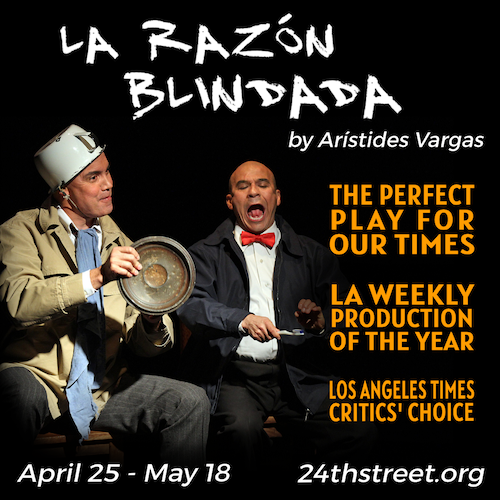Can’t Pay? Don’t Pay!
The Actors’ Gang
Reviewed by Dana Martin
Through June 11
The Actor’s Gang has balls. Originally co- authored by Italian playwrights Dario Fo and Franca Rame in 1974 with current translation by Cam Deaver, Can’t Pay? Don’t Pay! addresses the effect inflation has on a fed-up, abused and browbeaten working class at the mercy of greedy, powerful, anonymous corporations while being slowly crushed under the weight of capitalism. The Actor’s Gang delivers a robust, in-your-face and technically marvelous production, but the story is dated and often feels more like a lecture than a call to action.
The pressure of inflation, perpetual hunger and impending, widespread layoffs comes to a riotous head at the local supermarket as greedy grocers and their fed-up costumers square off.
After a riotous mob of hungry housewives conduct a spontaneous supermarket sweep, the neighborhood is in bedlam. An otherwise ordinary Antonia (Kaili Hollister), caught up in the crazed madcap mob of hungry women fed up with poverty level existence, ropes an unwitting Margherita (Lynde Houck) into participating in covering up her crime. The pair frantically hide the stolen goods under the bed of Antonia’s dilapidated apartment and on themselves. When Antonia’s law-and-order abiding husband Giovanni (Jeremie Loncka) arrives home, the women dupe him into thinking Margherita is spontaneously pregnant (she’s hidden groceries under her coat) in order to maintain their flimsy cover. Giovanni buys it, of course, and is thrown off the trail. The police (Steven M. Porter and Stephanie G. Galindo) conducting a neighborhood raid to identify the culprits and recover stolen property immediately prove their incompetence, and a battle of dim wits, comedic chaos and extreme silliness ensues.
The play is a political satire written in the style of commedia del’arte, invoking broad character archetypes and extreme physicality — which director Bob Turton handles expertly, finding many moments of zaniness and comedic flow. Turton keeps things moving at an unrelenting, break-neck speed throughout, which is exhausting but also necessary for the play’s comedic action.
The actors are fully physically committed and pull off an impressive amount of choreography.
But, they find the characters’ humanity only in fits and spurts, as they are often plagued by too much posturing and presenting. The characters repeatedly address the audience generally, broadly and loudly but make little direct, authentic connection. It feels like we’re being spoken at rather than to.
Kaili Hollister’s Antonia is spirited and tough, delightfully barreling through the play like a bull in a china shop. While her performance is fully physically and vocally supported, Hollister often lacks vocal dynamic. Lynde Houck’s performance as the petrified Margherita is silly and endearing. Bellowing and bumbling, Jeremie Loncka’s Giovanni perpetually leads with his pelvis, the epitome of a proud and posturing man. Luis Quintana’s Luigi is physically tense but sincere. Steven M. Porter’s performance both anchors and elevates the evening. He plays multiple plot-advancing characters such as a police officer, an FBI agent and an undertaker. He finds specificity, complexity and humanity in each one. Stephanie G. Galindo takes on multiple roles with Porter and they are excellent scene partners. Galindo, a newcomer to this production (the original staging was shut down in March of 2020 due to the pandemic) provides a light and youthful energy.
Many of the play’s comedic moments depend on technical elements and the production’s designers rise to the occasion. Richard Hoover’s expert set design is as creative as it is practical; he makes excellent use of the playing space which has all the elements necessary for this kind of comedic storytelling — it’s an actor’s jungle gym. Cihan Sahin’s projection design adds a whimsical quality to the storytelling. Dave Robbins’ music direction helps drive the play’s tempo and explores its anger by punctuating scenes with grunge rock. Bosco Flanagan’s lighting design is dramatic and supportive of the play’s style and flow. Prop design by Adam Jefferis and Rynn Vogel is a highlight as all the props are detailed, humorous and well-used. Stage Manager Gloria Briseno runs a tight show.
Cam Deaver’s current translation of Fo and Dame’s 1974 original script We Can’t Pay! We Won’t Pay! is peppered with current references but the play still feels dated. Can’t Pay? Don’t Pay! makes its point by running a gauntlet of idiocy — posturing, stupid antics, ridiculous side plots and highly exaggerated physicality. The style sometimes prohibits the message from meeting the audacity of the current moment: The working class is in crisis like never before. The cost of capitalism is steep and we, the working class, pay the price with our lives and livelihoods. Inflation continues to rise at a rate that is alarming and unsustainable. And while we continue to convince ourselves that eating dog food is a viable — even tasty — meal option, The Actor’s Gang wants to know why we aren’t rioting in the streets.
The Actors’ Gang Theater at the Ivy Substation, 9070 Venice Blvd., Culver City; Thurs.-Sat., 8 p.m.; through June 11. (310) 838-4264 or https: TheActorsGang.com. Running time: two hours and 15 minutes, with a 15-minute intermission.












